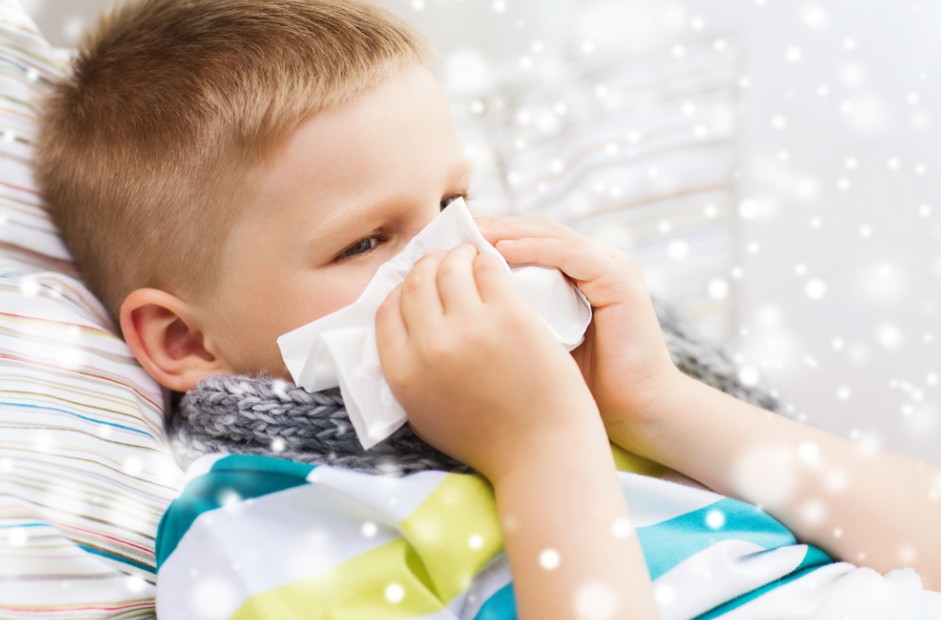Kid's Got a Runny Nose? Here's What to Do
During winter, finding a daycare or preschool without sniffles is tough. But when does a runny nose mean your child is sick and should stay home, or just a seasonal side effect?

Babies and toddlers often struggle with runny noses in winter. Some parents report their kids having a constant runny nose throughout the season, with varying severity.
"Runny noses in infants and toddlers cause significant discomfort because they can't blow their own nose," explain experts from CTS, one of Israel's leading pharmaceutical and consumer goods companies. "A blocked nose makes breathing difficult, affects appetite and sleep quality, and becomes a genuine nuisance for them and their parents. Many parents are unsure if the runny nose is a sign of illness requiring a home rest day or just a common occurrence that doesn't disrupt daily life. The answer is likely somewhere in the middle."
What is a Runny Nose?
A runny nose is a clear sign your body is fighting off viruses in the upper respiratory tract. One of the nose's key roles is to filter, warm, and humidify the air before it gets to your lungs. Its lining is rich with blood vessels and tiny hairs that trap viruses and particles, expelling them from the nose.
Mucus is produced by the nasal lining to wash away these viruses and irritants. Hundreds of different kinds of viruses can cause a runny nose, making preventive vaccines or treatments impossible.
There are two types of runny noses: allergic rhinitis caused by allergens like pollen, dust, or pet fur, often clear and watery; and viral rhinitis caused by infections, often greenish or yellow. Most kids deal with viral runny noses in the winter.

Is a Runny Nose an Illness?
Allergic rhinitis is not an illness since it's not caused by viruses and it's non-contagious. In contrast, viral rhinitis is the body’s reaction to invading viruses and can be infectious.
To prevent spreading, keep children with runny noses away from healthy kids. Maintain strict hygiene, change bedding, ventilate the home, and discard tissues infected with viruses. Sneezing frequently accompanies runny noses. Sneezing is a healthy, natural way for the body to remove viruses and other irritating particles, though the spray from a sneeze can spread infection. It's recommended that kids learn to cover their noses when they sneeze and wash their hands often.
Can a Runny Nose Lead to Complications?
Linked to viruses, a runny nose in infants can lead to complications. Excess mucus can flow to the throat, causing coughing or sore throats. Viruses may travel from the nose to ears, causing earaches, or to sinuses, causing sinusitis.
How to Handle a Baby’s Runny Nose
No direct medicine exists for a runny nose, apart from symptomatic treatments that ease symptoms until it clears on its own. Both natural and medical symptomatic treatments are available.
The Onion Method: Slice a dry onion, place it near the child’s bed, close to their face. While the baby sleeps, let them inhale the onion’s vapors. Though the smell is strong, this old remedy is said to dry up mucus.
Humidifiers: You can use warm or cold mist humidifiers. Cold mist humidifiers are safe, reducing burn risk. Warm mist ones can be enhanced with eucalyptus oil, aiding stuffy noses.
Saline Solutions: Drugstores offer saline solutions you can drop in the nostril to dry up mucus. Homemade saline solutions are not recommended as medical solutions are sterile and have a salt concentration identical to blood.
Elevation of Mattress: To keep mucus from draining into the throat and causing cough, elevate the mattress with a rolled towel.
Reducing Dairy Intake: Dairy increases phlegm production, so reduce dairy if your child has a runny nose. Increase water intake, as the body loses much fluid producing mucus.
Medications: Various medications can treat infant runny noses, so select practical medication allowing precise dosing by weight, like drops or syrup. This syrup contains only one active ingredient, pseudoephedrine, reducing congestion in nasal passages and eustachian tubes.

